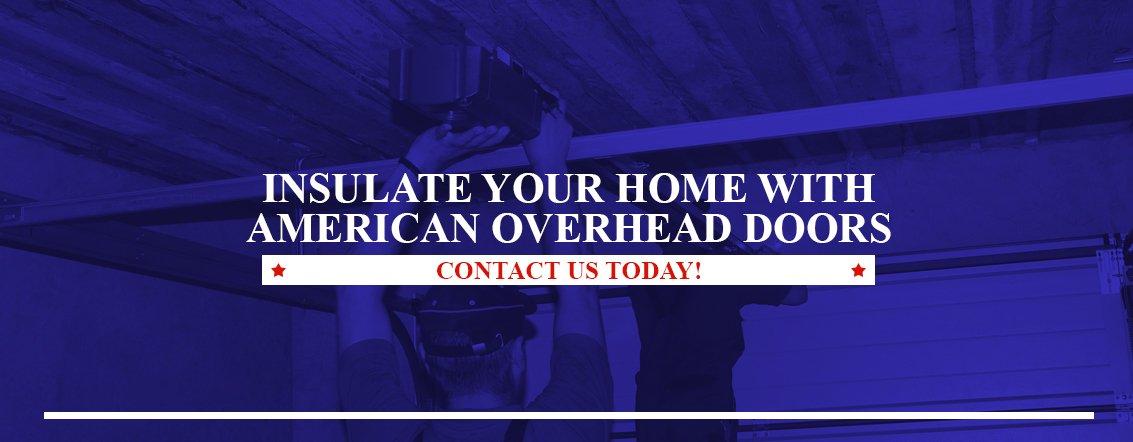Things to Consider When Buying a New Garage Door
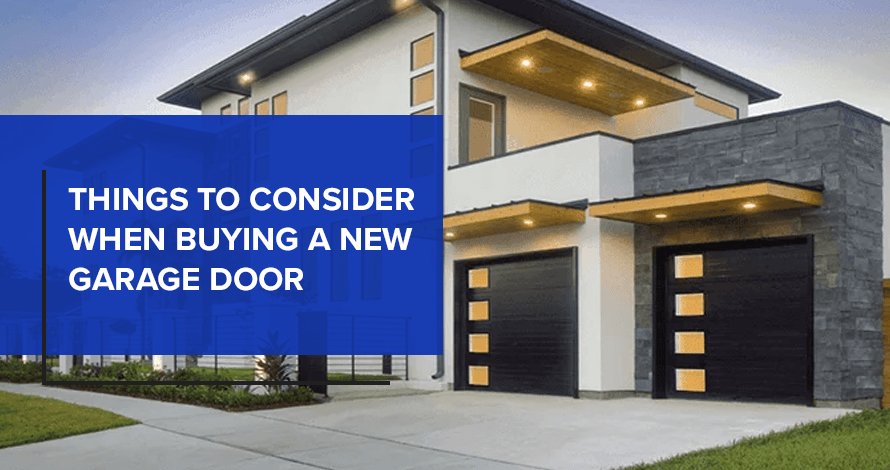
Residential garage doors are vital for security, functionality, convenience and curb appeal. An old or broken garage door can slow down your daily routine, making it more frustrating and stressful.
Though replacing your garage door involves some research, it doesn’t need to be overwhelming. We’ve designed this garage door buying guide to help you make the best decision for your home, so you can quickly find what you need.
5 Garage Door Buying Tips to Consider
You’ll quickly see how many outstanding options are available when you start comparing garage door features. However, that can make it challenging to narrow down your preferences!
Here are five garage door considerations to help you become a more informed customer.
- Appearance: Variables include your chosen materials, preferred color and the style that best matches your home.
- Sizing: Your garage door’s size will impact your overall cost and could be a factor in your material choice.
- Environment: If you have an insulated garage, you’ll likely want insulation on your garage door, too. The best option will depend on what you intend to use your garage for.
- Budget: It’s wise to decide your price range beforehand so you don’t overspend. Don’t forget to add the hardware and installation costs.
- Technology: How high-tech would you like your garage door to be? Many homeowners enjoy having remote openers, safety features and smart home integration. These technologies make your garage door more comfortable and convenient to use.
Now that you have a foundation to get started, let’s go deeper. Keep reading to learn more about prioritizing your preferences and finding the ideal garage door for your home.
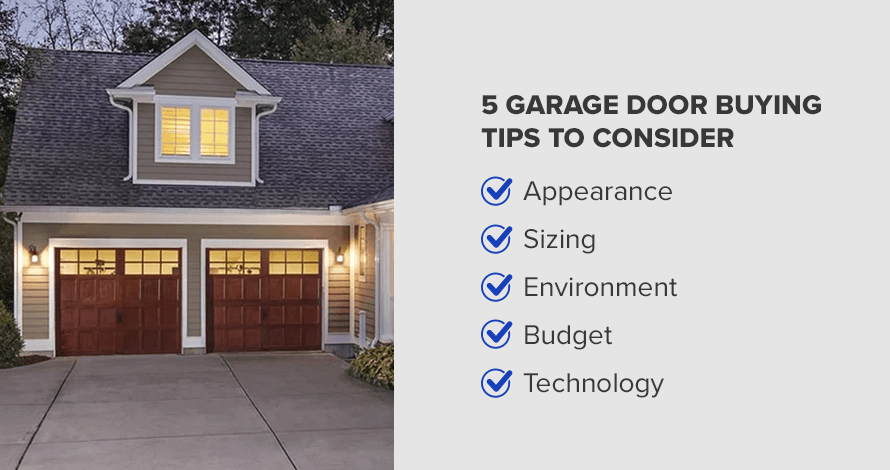
How to Buy a New Garage Door
Choosing a garage door requires many personal decisions, based on your goals, budget and style. To simplify the process, divide all the variables into two lists — needs and wants. You can quickly narrow down your best garage door choices by starting with needs.
Garage Door Needs
Here are some categories to consider for your needs list:
- Your budget
- The size of your garage door
- Insulation for your garage door
These items fit best in the needs list because they’re make-or-break decisions. When setting your budget, aim for a range that feels comfortable for you. You may need to research what costs are reasonable for a high-quality product.
Garage door size is also essential because it can impact affordability. A trailer-sized garage door will be much larger than a residential garage door for a one-car garage. Before you go shopping, measure your current garage door to get the correct dimensions.
An insulated door is only a must-have if the rest of your garage has insulation and an HVAC system. Pairing an insulated garage with an uninsulated door isn’t energy-efficient. However, an uninsulated door makes more sense if your garage isn’t insulated.
Garage Door Wants
Buying a garage door also involves gauging your preferences and looking for a model that meets as many needs and wants as possible. Multiple garage door customizations are available, so you can find the perfect fit for your home.
Here are some items to put on your wants list:
- The material you like
- The technology you’d prefer
- What style and color you’re interested in
Your chosen material will affect your home’s appearance, so you could consider it a need. However, we’ve put it on the wants list because everyone has different stylistic preferences. Many beautiful options at various prices can blend well with your home, including steel, wood and faux wood.
If you’re interested in additional security features, you can invest in technology to make your garage door safer and more convenient. Talk to your local dealer about remote openers and security systems.
Other garage door wants include your style and color preferences. Popular styles include farmhouse, contemporary, carriage house and traditional. Each blends well with a range of homes, so you can choose what best reflects your taste.
Maintenance Tips When Buying a Garage Door
Maintenance is another essential feature to consider when buying a new garage door. While many homeowners prefer the DIY route, leaving some tasks to a professional is better for safety reasons.
You must understand your purchase’s maintenance needs when shopping for a new garage door. For example, a wood garage door will need refinishing several times during its life span. That’s straightforward enough to do yourself if you’re handy around the home, or you can hire a professional.
Other upkeep includes replacing functional garage door components like torsion springs. If you purchase heavy-duty parts, they will last longer and require less maintenance. However, when it’s time to replace them, you must hire an experienced technician to do the job safely.
How to Choose the Best Garage Door Material
There are several considerations when choosing your garage door material, including your stylistic preferences and budget.
Different garage door styles lend themselves well to various materials. For example, carriage house and farmhouse garage doors are traditionally wood. In contrast, modern and contemporary garage doors are typically steel. This material’s sleek, minimalist appearance creates the perfect backdrop for modern homes. Steel comes in many colors, and you can add texture with different panels.
Another option is to purchase faux wood — a steel door with a wood texture or overlay. This material bridges the gap for homeowners who prefer the wood aesthetic but are working with a lower budget. Regardless of your material preference, you can find the perfect color choice and style option for your home.
Request an Estimate From American Overhead Doors
American Overhead Doors is a family-owned business in Connecticut. We serve families and businesses across the Constitution State, helping them get the ideal garage doors for their needs. We’re the state’s only Clopay® Master Authorized Dealer®, and we’re proud to offer such high-quality products to our customers.
When you work with us, you can always count on stellar customer service, personalized support and professional communication. We offer an industry-leading two-year labor warranty on every garage door installation and can also advise you on garage door selection and repair.
Contact us today for a free estimate and to learn how we can serve your garage door needs!
How to Measure for a New Garage Door
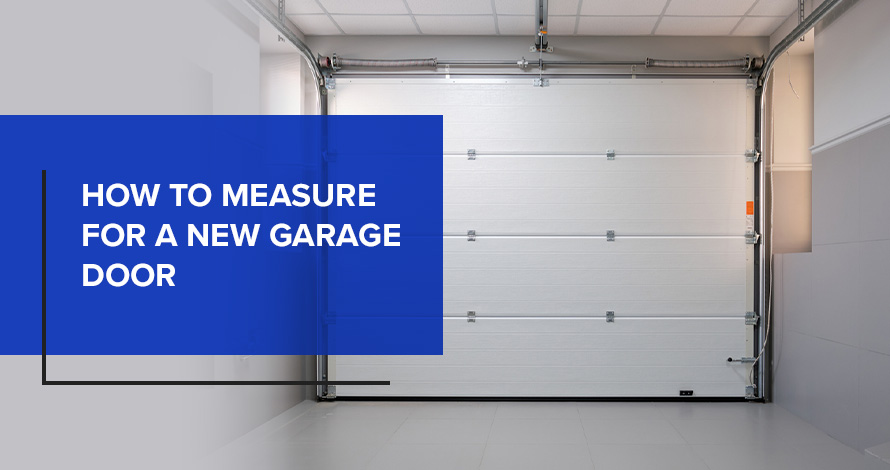
If you need to choose a new entryway, it’s vital to understand how to measure a garage door for replacement. Accurate measurements ensure your doors will fit as expected and help contractors give you a more precise estimate for your new residential or commercial garage door.
Garage Door Measuring Guide
Follow these steps when it’s time to replace or upgrade your doors.
1. Capture the Entry’s Width
Measure the widest point of your door’s opening. You should also check your door jambs to ensure they’re in good condition, squared and defect-free.
2. Measure the Opening’s Height
Find the highest point between the opening and the floor and note its distance. Inspect the floor for any damage or areas that aren’t level.
3. Get the Sideroom Measurements
Measure to the left and right of the door’s opening from the mouth to the nearest wall or obstacle. You’ll need about 4 to 5 inches on each side for mounting the vertical tracks. The center post should offer a minimum of 10 inches of width for two-door installations.
4. Find the Headroom Clearance
Record the distance from the top of the door’s opening to either the nearest obstruction or the ceiling. For most doors, you’ll want at least 15 inches.
5. Capture the Backroom Clearance
Measure the distance between the door’s opening and the back wall or nearest obstacle, such as a lighting fixture. For a sectional-style residential door, you’ll need a minimum of the door’s height plus 18 inches for a manually operated door. When using an overhead opener instead, add 50 inches to the door’s height to find the minimum clearance requirement.
Special Considerations for Commercial Doors
Clearance requirements for commercial models vary significantly based on the door’s style and height. Generally speaking, you’ll need:
- Backroom width equal to headroom space for coiling doors.
- Backroom equal to the door’s height plus 23 inches for a 2-inch track or 25 inches for a 3-inch track — and more if you install an overhead operator.
- Clearance of 4 to 6 inches per side for a manually operated door.
- Clearance of 5.25 to 9.5 inches per side for doors operated by a chain hoist.
- Clearance of 14 to 18 inches on at least one side for motor-operated models.
Request an Estimate From American Overhead Doors, Inc.
American Overhead Doors, Inc. is a family-owned company with over 30 years of industry experience, five-star reviews and customer praise. Our well-qualified team can help you with professional garage door replacement, residential door repair services and commercial repairs.
Take the next step and request a custom estimate today, or call us at 860-347-1507 for personal assistance.
Reasons to Buy an Insulated Garage Door in Connecticut
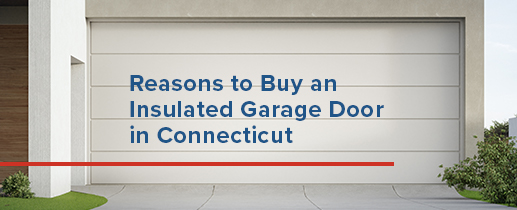
An important part of many residences that homeowners often overlook or put off tending to is their garage. As garage doors cover the home’s largest doorway, it is important for you to make any necessary repairs or upgrades to keep your garage functional, economical and comfortable. One of the many ways to do this is to invest in an insulated garage door.
Insulated garage doors are especially important if you live in an area like Connecticut, where the weather is often fickle and unpredictable. Having an insulating garage door is beneficial for many reasons, as it can increase the overall efficiency and temperature control of your home. If you have been putting off making garage door upgrades, whether it be for financial or aesthetic reasons, you should consider making these changes now before the weather turns cold and you feel the effects of a non-insulated garage door in your home.
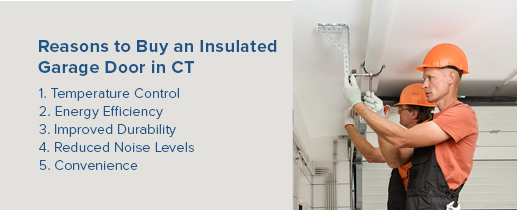
What You Need to Know About Garage Door Insulation
If you live in a home with a non-insulated garage door, you may not yet have upgraded because you do not know the extent of an insulated garage door’s benefits. Or maybe you do not know what information you need to understand when deciding which garage door is best for you home. Two important factors to consider when getting an insulated garage door are its R-value and U-factor.
R-Value
The first thing you should look at when deciding on an insulated garage door is the insulation’s R-value, or the measure of the insulation’s thermal resistance per unit area. More effective insulation has a higher R-value, as the material is more resistant to conductive heat flow. The R-value of insulation depends on many factors, including the type of insulation, its density, its thickness and the number of individual layers of insulation.
More simply, the R-value represents the insulation’s ability to slow the transmission of heat. Better insulation has a higher R-value because it has a slower transfer of heat. This means that if you choose an insulated garage door with a higher R-value, it will slow the heat that leaves your house in the winter and allow the summer heat in at a slower rate.
You can determine your insulation needs by looking at the energy efficiency codes directed by the International Code Council (ICC). The entire state of Connecticut falls into Climate Zone Five A, meaning that it has a minimum average temperature between -15° and -20°F. Based on the attributes of the fifth zone, the ICC recommends a ceiling R-value of at least 37 and a wall R-value of 13-20, depending on the wall’s material makeup. Based on this information, in Connecticut, your garage door should have an R-value of at least 14 and 16 for garage spaces commonly used or sharing walls with primary living spaces.
Different garage doors have a wide range of R-values, so knowing what you need for your home will help narrow down the decision on what garage door will benefit you and your home the most.
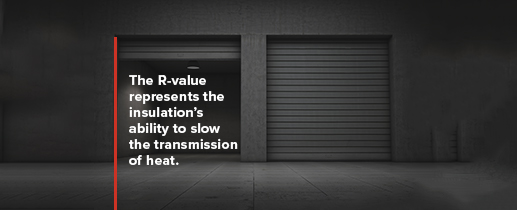
U-Factor
Another factor to consider when choosing a garage door is its overall ability to transfer heat. Called the U-factor, this measures how much heat transfer occurs through the entire door, whereas the R-value only defines the heat flow capabilities of the insulation. Materials with lower U-factors insulate better, making them more energy-efficient than ones with higher U-factors.
U-factor measurements can be more accurate than R-values because while R-values look at the heat loss of insulation, U-factors account for the door as a whole, including frames, panels and other hardware. When selecting a new garage door with more energy efficiency, look for a garage door that advertises a lower U-factor to find a door that can help keep the heat in your home in the winter and the sun out in the summer.
Reasons to Buy an Insulated Garage Door in CT
Connecticut is a beautiful place to live, but the constantly changing and and often severe weather can sometimes make it difficult to keep your home as effective and comfortable as it should be. One way to avoid being unprepared for the weather is to get your house ready with an insulated garage door. Some reasons to consider this option include:
1. Temperature Control
If your home has an attached garage, this means that the garage is part of your home and shares at least one wall with your living space. As the garage door is most likely the largest entryway into your home, it is important to ensure that this is a well-insulated point to lessen heat transfer.
When you have your house’s heating system on in the wintertime, it works to heat your home to your desired temperature. If your attached garage does not have proper insulation, you lose some of the warmth that your heating system provides. The same is true for air conditioning in the summer. As your air conditioning works to produce cooler air in your home, a garage without proper insulation will allow some of the cold air to escape.
While you may think that a little heat transfer from your garage may not make too big of a difference, it might surprise you how much your garage can affect the heating and cooling of your home. In fact, data from the Clopay engineering department reveals that in the situation where it is 20 degrees outside, if you have a non-insulated garage door, the temperature of your garage will be around 30 degrees. Contrarily, if you have an insulated garage door, the temperature of your garage stays closer to 42 degrees. An insulated garage door makes a big difference in keeping your home comfortable and your energy use efficient.
2. Energy Efficiency
Relating to the idea of temperature control is the energy efficiency of your garage door. If you have your heat or air conditioning on but the hot or cold air escapes through the garage, your heating or cooling system has to work harder to compensate for the lost air. This makes it harder for your heating and cooling system to regulate temperature, thus making it do more work. Since your heating and cooling system has to work harder to maintain your home’s desired temperatures, this increases the cost of your energy bill, not to mention the wear and tear on the HVAC system. Therefore, investing in a garage door with proper insulation now can help your home be more energy-efficient, saving you money in the future.
3. Improved Durability
From the daily use of raising and lowering your garage door to the occasional storm damage or weather wear, your garage door will probably get some marks and dents over time. Although the everyday wear and tear of your garage door is a common and expected thing, there are still ways to help improve the durability of your garage door.
One of the best ways to ensure that you have a stronger and more durable garage door is by getting a door with insulation. Insulation adds an extra layer to your door, giving it more rigidity and enhanced durability. Whether you choose a garage door insulated by a solid panel of insulation between two layers of steel or aluminum, or a garage door with foam that expands and hardens to fill the gaps between the two metal panels, both insulation techniques work to strengthen your garage door.
Another aspect of your garage door that insulation works to protect is the internal hardware. Extreme temperatures can affect important parts of your garage door’s internal system, such as the springs, wires, cables, brackets and rollers. It is important to have a garage door with high-quality insulation to prevent any breakage or erosion of these parts, as they are what keep the garage door functional and safe.
4. Reduced Noise Levels
If you live in a home with people on different work and sleep schedules, you may worry about waking everyone up with the sound of your garage door opening and closing. While you can expect any mechanical system to make some noise because of its moving parts, your garage door should not make excessive noise. If you check the internal hardware of the door and do not find any specific problem causing the noise, the culprit may just be the door itself.
Lightweight, non-insulated garage doors tend to shake and rattle more than their heavier, insulated counterparts. If you have a non-insulated garage door, its panels may shake as it moves along the track, whereas an insulated garage door that is thicker with a tight construction may have less hollow space or loose materials, which can limit the noise your garage door makes when in motion. Also, insulation can act as a buffer that absorbs vibrations and noises, muffling some of the sounds the garage door may cause.
For similar reasons, insulated garage doors can also help lessen the noise getting through the door from the outside. An insulated garage door can help dampen the noise of anything from a loud storm outside to your neighbor’s lawnmower. While insulation will not dissolve all the noise pollution that gets into your home, it definitely can muffle outside sounds, making them more muted than without insulation.
5. Convenience
Another reason to get an insulated garage door is that it can help boost your overall convenience and comfort within your home. One of the many perks of an insulated garage door is that because it keeps the warm air from your home in the garage, leaving your home in the winter can be more comfortable. If you keep your car in the garage, an insulated garage door makes it so you do not have to step outside in the cold weather, increasing the convenience of your garage, especially when bringing in groceries or buckling kids into their car seats.
Similarly, with the air in your garage staying warmer than it would without an insulated garage door, you avoid letting the cold outdoor temperatures blow into your home. Your garage acts as a vestibule or buffer zone between the temperature-regulated space of the home and the outdoor elements. This lessens the effect the outdoor air has on your living space.
Also, if you and your family use the garage as an extension of your living space or if someone in your home likes to work in the garage, having an insulated garage door makes temperature control of the garage much more convenient. If you decide to go to your garage and work on a project, doing so with a non-insulated door will have much more extreme temperatures in the garage. For example, some insulated garage doors can keep a garage between 10 and 20 degrees cooler or warmer than the outside temperature.

Find an Insulated Garage Door with American Overhead Doors
When facing change, it is reasonable to be hesitant, researching all possible options before deciding on what may be best for you. Regarding choosing a new garage door, there are a lot of things to consider, such as budget, style, brand and installation. The good news is that you do not have to explore your options and make these decisions alone.
If you want to replace your garage door and upgrade to an energy-efficient and stylish one that meets the needs of your home, come to American Overhead Doors, Inc. We have a wide variety of Clopay garage doors that will give your home eye-catching curb appeal while also helping increase your home’s energy efficiency.
From Coachman style doors to classic steel, custom wood to limited-edition styles, we offer a wide selection of doors of different styles, colors and materials. We can help you find the perfect door that will meet your garage door wants and needs. Because Clopay doors have a great balance of looks and functionality, whatever you need in a new garage door, American Overhead Doors will help you find the perfect fit for you.
Contact Us Today
At American Overhead Doors, we are a family-owned company that has served Connecticut customers since 1987. Holding the privileged status of being the only Clopay-Master Authorized Dealer in the state, we pride ourselves on our level of expertise and responsiveness in sales, installation and service, on top of our dedication to our customers.
If you are ready to start shopping for your next garage door, contact us at American Overhead Doors today by giving us a call at 860-347-1507 or filling out our online contact form. Also, do not hesitate to stop in our showroom, where we have 16 doors and 6 automatic openers on display, a wide variety of material samples and brochures sure to give you some creative inspiration!
An Article on Professional Garage Door Installation Versus the DIY Market
Check out this great article on professional garage door installation versus the DIY market!
Guide to Buying an Insulated Garage Door in Connecticut
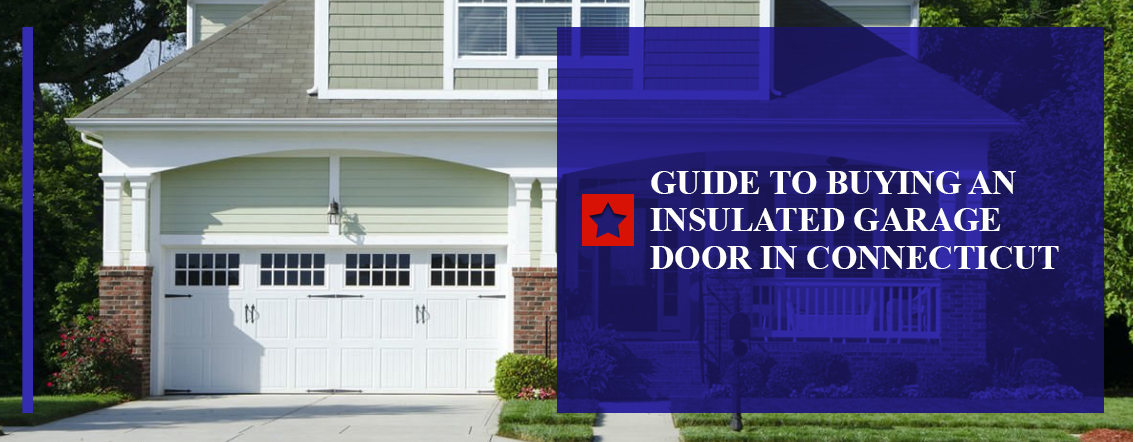
Let’s face it — Connecticut weather is unpredictable. Especially in the spring and autumn months, outdoor temperatures can spike or drop in a heartbeat. With an insulated garage door, you can always be sure you’re pulling in to a comfortable garage, no matter the season. An insulated garage door has many benefits that make it worth the cost. There’s also a lot that goes into choosing the right one for your Connecticut home, which is why we’ve put together this insulated garage door buying guide.
Browse Our Garage Door Inventory
Benefits of an Insulated Garage Door

Does an insulated garage door make a difference? Yes.
An insulated garage door is energy-efficient, convenient and comfortable. Insulation helps you better protect your garage door, and creates better conditions for both your car and anything else you store in your garage. The door itself may give your home more peace and quiet and can increase your curb appeal. All these benefits make an insulated garage door a fantastic investment.
1. Promotes Energy-Efficiency
Your home’s walls, ceilings, windows, floors and doors all create what’s called a “home envelope.” The barriers that keep the extremes outside allow you to heat and cool your home throughout the year. The more energy-efficient your home envelope — the better its insulation and the less it leaks air — the more money you’ll save.
The garage door is the largest entry point to your home and an often overlooked section of your home envelope. Part of the reason for this is that garages aren’t usually considered living spaces, so they have different construction standards. Any garage attached to the rest of your house shares at least one wall with another room. You might even have a bedroom directly above the garage.
So, even if you’re not piping heat into your garage, your home is still losing warmth. As warm air seeps in through a non-insulated garage door and into the outside world, your heating system works harder to compensate. Likewise, in the summer, your air conditioning quickly escapes through your garage door.
An insulated door keeps warm air in during cold weather and heat and humidity out during warm weather. According to one study, a garage with a non-insulated metal door will be about 30 degrees on a 20-degree winter day. On the same day in a garage with an insulated door, the temperature will be around 42 degrees. With one below freezing and the other above, an insulated door can make a huge difference in how you heat your home and help you cut down your energy bill, too.
2. Increases Durability
Over the years, garage doors take quite the beating. With regular use, the bottom panel of the door is making contact with a concrete slab many times a day. It might also be the victim of your kids’ backyard sporting events or take some flak from airborne pebbles on a windy fall day. Dents on your garage door can affect your home’s curb appeal. It’s crucial to look for a sturdy garage door that can withstand daily wear and tear.
Insulation adds extra rigidity to a garage door, which results in more durability. Many insulated garage doors have a solid panel of insulation sandwiched between two layers of steel or aluminum. Others are injected with foam that expands as it hardens, filling the space between the metal panels. Both of these types of insulation make a garage far less susceptible to dents.
The internal hardware of your garage also fairs better thanks to the milder internal temperature in your garage. Extreme temperatures can affect springs as well as the lubrication of rollers and hinges. A machine-operated garage door opener will also have a longer lifespan when it’s not exposed to cold temperatures or high heat.
3. Reduces Noise
If you work early or late hours, you might be concerned about waking your family with the sound of your garage door opening and closing. Garage doors have a lot of moving parts, and with anything that moves, some noise is expected. When the sound suddenly becomes bothersome, the first step should be to check the hardware. Worn out rollers can cause grinding, while a loose chain or track can produce a jerking sound.
If there is no direct problem causing the noise, however, the door itself could produce an annoying sound. A lightweight non-insulated garage door tends to be the biggest offender. Panels may shake as they move along the track, causing a rumbling sound. Insulation can absorb vibration and dampen noise, which is a major plus if you choose to upgrade to insulated doors. Also, their thick insulation and tight construction nearly eliminate hollow space and loose material inside your garage door panels, which also limits noise.
An insulated garage door can also create a quieter environment, even when the door is not in use. Just as an insulated door serves as a defensive barrier against the elements, it also stops soundwaves in their tracks. Anything from a car speeding by or a leaf blower buzzing to a dog barking can disturb your home. While you won’t wholly sound-proof your home by insulating your garage door, the extra padding helps muffle these sounds.
4. Protects Your Car
The whole reason we have garages in the first place is to shelter your car from the elements. A garage protects your car from ice and snow in the winter and shades it from the harsh summer sun. When the temperature in the garage is not much different from the outdoors, your car may still be suffering.
Winter is tough on car batteries because the oil starts to thicken and makes it more difficult for the engine to turn over. Cold weather can also prevent your battery from recharging properly. When a car is parked in a cold garage, the tire pressure will go down. A warm, comfortable garage can improve the life of your car and keep its parts working like they are supposed to.
5. Enhances Comfort and Convenience
The easiest way to make a garage warmer — without racking up a higher heating bill — is to insulate your garage door. How much warmer is an insulated garage door? One homeowner with a Clopay® garage door saw amazing results from the Intellicore® insulation system. Before the new door, the average temperature inside the garage was an average of 21 degrees warmer than the outside temperature. With the insulated garage door, the average temperature saw an average of 49 degrees above the outside temperature.
On days when the temperature drops below freezing, stepping out of your car into a toasty garage can make a big difference. You’ll feel more comfortable and endure less cold before and after your daily commute. As you transport groceries to the kitchen and get your kids in and out of the house on chilly days, you’ll appreciate the convenience of a warmer garage.
The added warmth also creates a vestibule effect. Many restaurants use a vestibule to cut out the blast of cold air that enters the room when the front door opens. Likewise, your garage is essentially a vestibule for your home. When the temperature in your garage isn’t much warmer than it is outside, you might send a wave of cold air indoors whenever you enter your home. An insulated garage door can make the living areas near your garage more comfortable.
You also might treat your garage as an extension of your living space. You might use the area as a workout room or work on your DIY projects. Some people work with power tools in the garage, while others use the space as a game room outfitted with a pool table. If you do a lot in your garage, you’ll appreciate the extra warmth and prolonged use time an insulated garage door can provide.
Types of Garage Door Insulation
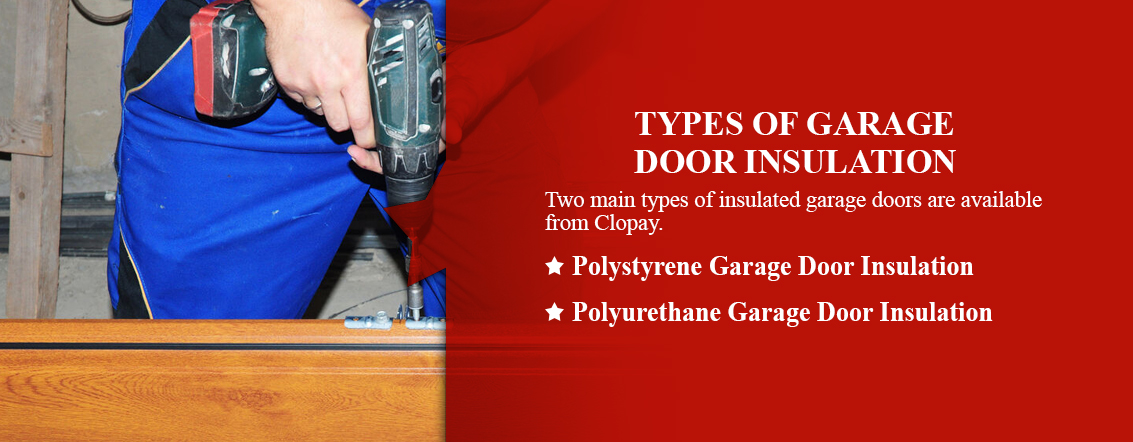
Two main types of insulated garage doors are available from Clopay. Some of their models are available with polystyrene insulation, while others use Clopay’s proprietary Intellicore® Polyurethane Insulation. A selection of garage doors, including the Coachman, Grand Harbor, Gallery and Modern Steel collections, allow you to select from either form of insulation. Both types offer some unique advantages:
Polystyrene Garage Door Insulation
Garage doors insulated with polystyrene are called double-layer doors. Polystyrene is the same material you’ll find in an aftermarket garage door insulation kit. Polystyrene comes in thick rigid panels which would be inserted between the steel or aluminum panels of your garage door. The main advantage of a polystyrene insulated garage door is that it costs less. It will do far more to protect your garage than a single-layer door, and you’ll get the same advantages of increased durability, sound dampening and a better indoor climate.
Polyurethane Garage Door Insulation
The best insulated garage doors are made from Polyurethane. Polyurethane insulated garage doors are called triple-layer doors and have increased insulating power. It’s a highly energy-efficient material comprised of polyurethane foam. This foam is injected between the outer layers of your garage door. The foam then expands to fill the entire garage door, making it almost completely solid. It bonds to the steel surface, making the door more durable and less prone to dents. It also provides the best climate control and superior sound isolation.
Insulated Garage Door R-Value Explained
If you begin shopping for an insulated garage door, you’ll probably notice that each one has an R-value listed in the description. R-value is a measurement used to understand a garage door’s insulating abilities. Technically, an R-value represents the ability to slow the transmission of heat. The higher the R-value, the slower the transfer of heat, and the better the insulation. A high R-value slows the heat leaving your house in the winter and the heat radiating from the sun in the summer.
It can be helpful to look at the R-value of the rest of your house to see how your garage stacks up. The International Code Council provides minimum recommendations for R-values in a home within different climate zones. Connecticut is in Climate Zone Five, where they recommend that a ceiling have an R-value of at least 38. A wall should have insulation with an R-value starting at 13 or 20, depending on the type of wall and the way insulation is placed.
When you look at Clopay’s garage doors, you’ll notice they have R-values ranging from 6.3 to 20.4. When you consider the size of your garage door, you should treat it almost as if it’s another wall of your home. If you live in places with lots of weather fluctuation and have an attached garage, you should insulate your garage door.
That’s why we recommend an R-value of at least 14 for garage doors in Connecticut. Here in the northeast, we see a huge fluctuation in temperatures. We can easily have subzero temperatures in the winter and 101-degree weather in the summer.
Our extreme New England weather patterns call for plenty of padding throughout your entire home envelope, and your garage is no exception. If your garage shares a wall with the main living space or sits below a bedroom, it’s essential to have a high R-value. If you spend a lot of time in your garage or use it as another living area, we recommend an R-value of at least 16 for your insulated garage door.
Are Insulated Garage Doors Worth It?
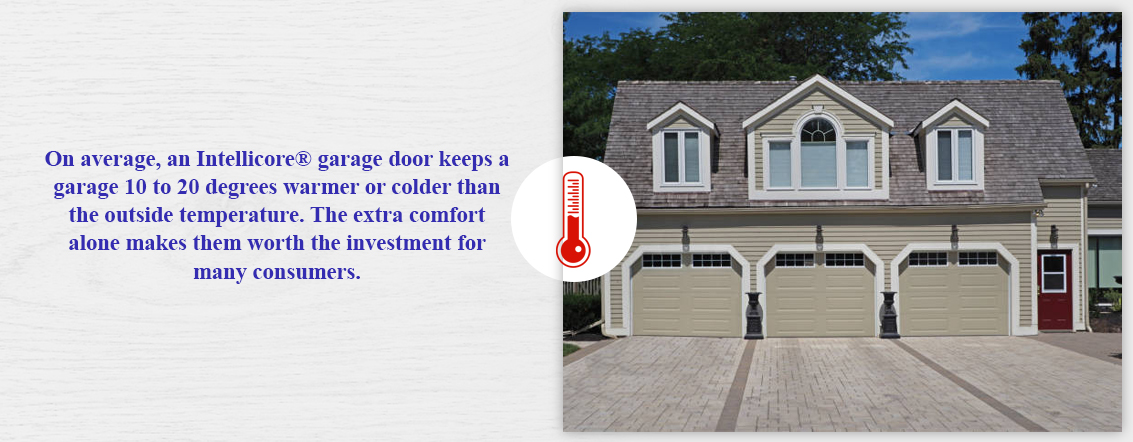
How much an insulated garage door costs depends on several factors. The size of your door frame, the model you select and the type of insulation you want will all influence the price you pay. In general, buying a garage door is an excellent investment for your home. A recent study found that homeowners recoup 98.3 percent of their garage door cost after selling. An upscale garage door can even recoup more than 100 percent of its original value.
When you opt for an insulated garage door, you get an attractive entry that will resist damage for years. If you plan on selling your home, the added curb appeal can add to the value of your home. With an insulated garage door, you also get the added value of energy efficiency, which can lead to significant savings over time. Clopay’s Intellicore® Polyurethane insulation is energy-efficient, helping you cut heating and cooling costs.
On average, an Intellicore® garage door keeps a garage 10 to 20 degrees warmer or colder than the outside temperature. The extra comfort alone makes them worth the investment for many consumers. For temperature-sensitive items in your garage, an insulated garage door can preserve their lifespan. Clopay’s Intellicore® doors are some of the best insulated garage doors in Connecticut.
Furthermore, data demonstrates the sound-isolating power of its proprietary insulation material. Clopay engineers compared the sound of a basketball bouncing off a garage door on an insulated versus uninsulated garage door. They found that their Intellicore® door outperformed other models. While a basketball hitting a non-insulated garage door will produce 96 decibels, the same basketball hitting an insulated door makes only 80 decibels. Since decibels are logarithmic, the Intellicore® garage door sounds approximately three times quieter.
Insulate Your Home With American Overhead Doors
If you’re looking to replace your garage door with a beautiful and energy-efficient insulated garage door, come to American Overhead Doors, Inc. We have a vast selection of Clopay garage doors, with many insulation options and R-values to choose from. Upgrade your home and get your garage ready for any weather Connecticut throws your way with an insulated garage door from American Overhead Doors.
Are you ready to start shopping? Browse our collection of Clopay garage doors and even see how the door will look on your house with our Clopay Door Imagination System. When you’ve found the insulated garage door to complete your home, request an estimate to receive prices.
Guide to Buying a Contemporary Garage Door in Connecticut
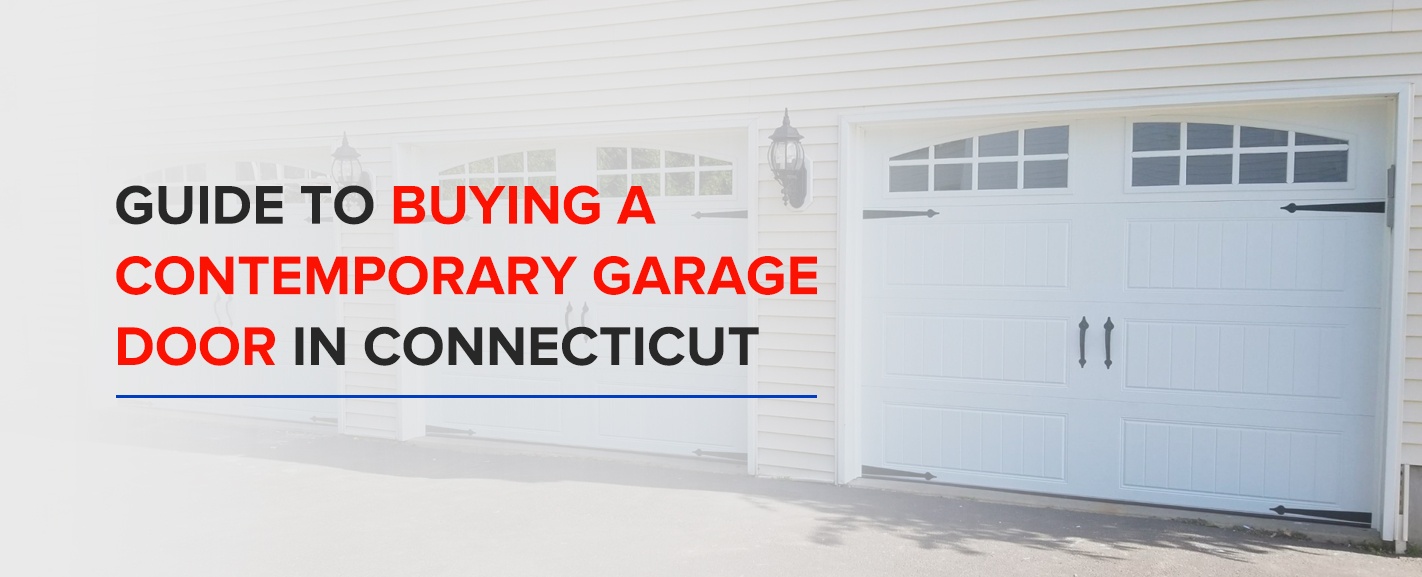 Garage doors play a prominent role in most homes, both functionally and aesthetically. It needs to work reliably day in and day out. It has to survive the elements and inclement weather. It has to be able to take some abuse, whether from getting smacked with soccer balls or being bumped with a car. And, of course, it must suit the look and feel of your home’s exterior. There’s more than you might imagine behind buying a garage door, so we’ve put together a guide to help you pick a contemporary garage door in Connecticut. (more…)
Garage doors play a prominent role in most homes, both functionally and aesthetically. It needs to work reliably day in and day out. It has to survive the elements and inclement weather. It has to be able to take some abuse, whether from getting smacked with soccer balls or being bumped with a car. And, of course, it must suit the look and feel of your home’s exterior. There’s more than you might imagine behind buying a garage door, so we’ve put together a guide to help you pick a contemporary garage door in Connecticut. (more…)



